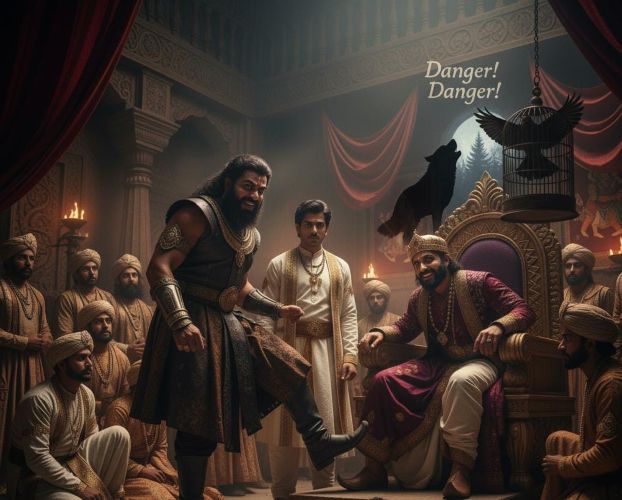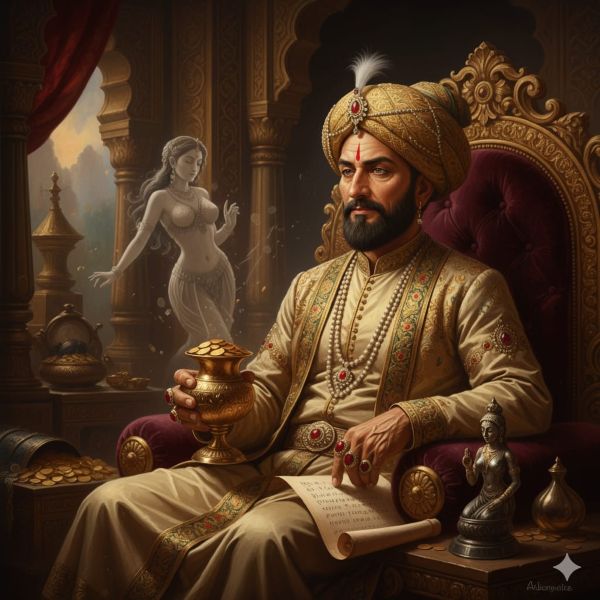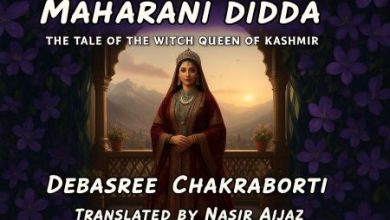Maharani Didda: Witch Queen of Kashmir-3

“Naravahana thought to himself: What is Prime Minister Phalguna doing? Knowing everything — fully aware of the king’s character — he was giving his daughter to an incompetent, debauched ruler. He might as well have tied her hands and feet and thrown her into the waters of the Vitasta. The lust for power — how cruel it can make a father. For his own prosperity, he was offering his own daughter as a sacrifice to a monster.”
Maharani Didda: Witch Queen of Kashmir
By Debasree Chakraborti
 The royal court of Maharaja Kshemagupta was in session. And while recording the description of that debauched king’s assembly hall, even Mahakaal himself seemed to hesitate in shame and disgust.
The royal court of Maharaja Kshemagupta was in session. And while recording the description of that debauched king’s assembly hall, even Mahakaal himself seemed to hesitate in shame and disgust.
After Parvagupta passed away, his son Kshemagupta ascended the throne. On a dark, storm-clouded night of the waning fortnight, when a jackal howls from a distant cremation ground and a child in its mother’s arms bursts into tears in terror, in the same way a dreadful era in Kashmir’s history had begun at this time.
The king’s intoxication from the previous night had not yet worn off; he kept laughing to himself, perhaps reliving some pleasant memory of the night before. The seat on the king’s right side was empty today — the prime minister was away on urgent work. Naravahana sat to the king’s left, deeply absorbed in thought, repeatedly glancing at the entrance of the assembly hall. He had not forgotten the events in the king’s pleasure palace the previous night. Prime Minister Phalguna had promised him that today, in the council, he would resolve the Kashmir issue. But was there truly any solution to Kashmir’s troubles? A thousand questions crowded Naravahana’s mind.
Prince Sangramadeva had been his childhood friend, and Kshemagupta too had been close to him when he was the crown prince. Sangramadeva’s father, Yashaskardev, never kept the young prince apart from his subjects. But then came the prince’s horrific death. Naravahana closed his eyes, trying to steady himself. His grandfather’s words came back to him. After Sangramadeva’s murder, when Parvagupta took the throne, all of Kashmir burst into flames — the Damars rose in rebellion, levied taxes as they pleased, and began looting and plundering. At that time his grandfather had said that in the Kali Yuga, adharma would always triumph; in such times one must act with a cool head, otherwise neither time nor circumstances can be brought under control. Among countless evil men, there will always be a few good ones who must take hold of the reins of the situation, or else society, home, and the state itself will fall into ruin.
Naravahana felt as if Kshemagupta were a wooden puppet — each part of his body and mind tied to some invisible string, controlled by unseen minds. Naravahana resolved that even though he was neither king nor prime minister, he would do whatever was necessary to protect this kingdom. While Naravahana was absorbed in his thoughts, at that very moment a round object rolled in from the entrance and stopped at the Maharaja’s feet. At first, Naravahana could not understand what it was, but the excited reactions of the others present in the court snapped him out of his trance. He saw that a severed human head lay at the feet of Maharaja Kshemagupta. Long flowing hair, a large beard, and eyes wide like bilva leaves — it looked like the head of some sage-like man. Just then, roaring with laughter, Prime Minister Phalguna entered the hall.
 After Kshemagupta became king, all scholars and learned men had withdrawn from the royal court, for alongside Parvagupta’s murder and the widespread looting, during his son’s reign the abduction of women had reached its peak. Added to that were the daily visits of courtesans to the court and the constant revelry. Gradually, instead of a gathering place for wise and virtuous men, the assembly hall had turned into a den of degenerates — all loyal followers of Prime Minister Phalguna.
After Kshemagupta became king, all scholars and learned men had withdrawn from the royal court, for alongside Parvagupta’s murder and the widespread looting, during his son’s reign the abduction of women had reached its peak. Added to that were the daily visits of courtesans to the court and the constant revelry. Gradually, instead of a gathering place for wise and virtuous men, the assembly hall had turned into a den of degenerates — all loyal followers of Prime Minister Phalguna.
Phalguna stopped his booming laughter and stared firmly at the king for a few moments. Then he said, “Maharaja, I had promised that I would uproot the Damar rebellion from its roots. I have kept my word.” Raising the fingers of his left hand, he continued, “Behold, Maharaja — the head of Brajeshwardev, the main strength of the Damar uprising.” Then turning his neck slightly, he glanced at Naravahana and added, “Last night, I burned down their remaining village as well. Not a single Damar is alive anymore.”
Naravahana listened silently. Suddenly he saw the Maharaja slowly descending from his throne. Seeing him come down, Naravahana stood up, for he knew his friend’s condition well — often the king lost control of his steps and fell. Kshemagupta came down, picked up the severed head, examined it closely, then grabbed Brajeshwardev’s hair and lifted the head high above his own. He began to whirl it around. Kshemagupta shouted, “We have achieved victory! Victory!”
Everyone joined the Maharaja in the ecstatic celebration of triumph. Naravahana’s entire body shuddered; it seemed to him as though Kashmir had turned into a land of demons, where humans had become thirsty for each other’s blood.
At that moment, Prime Minister Phalguna suddenly let out a fierce roar, his face contorted with terrifying brutality. Maharaja Kshemagupta was extremely afraid of him. Hearing that roar, the severed head slipped from the king’s trembling hands. His eyes widened in shock, and trembling with fear, he looked toward the Prime Minister. The other courtiers froze as well, for each one of them was merely a toy in Phalguna’s hands.
Phalguna noticed Brajeshwardev’s head lying near his feet. In a fit of rage, he kicked it hard and shouted, “This victory would never have been possible without me! You— you are utterly worthless! Who do you think maintains the peace and order of this kingdom? Because of whom do you spend your days drowned in pleasure and indulgence? Tell me — who is that person?”
Naravahana simply watched the Prime Minister’s arrogance. Truly, his grandfather had been right — in the Kali Yuga, everything would turn upside down. How utterly devoid of dignity must a king be for his minister to dare speak to him this way!
Naravahana now stepped forward and stood beside Kshemagupta. Fixing his gaze on the Prime Minister, he said, “It is sheer insolence to address the Maharaja in this manner. You should be aware of your own position — and that of the Maharaja. Surely you have learned this lesson.”
A mocking smile curved the edges of Phalguna’s lips. Suddenly calming down, he said, “Don’t ask me that question — ask the Maharaja.”
 Then he leaned toward the king and said, “Maharaja, you tell them — what is the position of Prime Minister Phalguna in this kingdom?” Raising his eyebrows, he looked at the king with a piercing sideways glance.
Then he leaned toward the king and said, “Maharaja, you tell them — what is the position of Prime Minister Phalguna in this kingdom?” Raising his eyebrows, he looked at the king with a piercing sideways glance.
Maharaja Kshemagupta spoke at first in a very soft voice: “Your place is above everyone. Without you, this kingdom would have fallen into ruin. You are the protector of Kashmir, my praja the lord of all your subjects. Everyone, shout: Victory to the Great Minister Phalguna!”
“Victory!”
Together with the Maharaja, everyone loudly proclaimed, “Victory to the Great Minister Phalguna!”
With a deeply mocking smile, Phalguna glanced once at Naravahana. Then he raised his hand, signaling everyone to stop. When silence returned, he turned to the Maharaja and said, “A little while ago, you called me the sovereign of Kashmir. It is the duty of devotees to always keep their lord pleased; otherwise divine grace does not descend. Besides,” he added, looking at Brajeshwardev’s severed head, “for saving the kingdom from such a formidable enemy, I certainly deserve a great reward.”
A tremor passed through Naravahana’s chest. He had long known that Phalguna had a hungry eye on the throne of Kashmir and would one day seize it when the right moment arrived. Perhaps that moment had finally come. Surely now Phalguna would use this opportunity to claim the throne as his right.
But no—what Naravahana feared did not happen.
Instead, Phalguna gripped the Maharaja’s shoulders with both hands. The blood on Phalguna’s hands smeared onto the king’s white garments, leaving dark stains. Pressing down on Kshemagupta’s shoulders with all his strength, he said:
“Maharaja, it has long been my wish that my daughter become the queen of Kashmir. When she was born, seeing her moonlike radiance, I named her Chandralekha — as though every part of her body had been shaped by God from moonlight. She alone is worthy of becoming the queen of Kashmir.”
Naravahana thought to himself, what is Prime Minister Phalguna doing? Knowing everything — fully aware of the king’s character — he was giving his daughter to an incompetent, debauched ruler. He might as well have tied her hands and feet and thrown her into the waters of the Vitasta.
The lust for power — how cruel it can make a father. For his own prosperity, he was offering his own daughter as a sacrifice to a monster. Hearing the description of Chandralekha’s beauty, Maharaja Kshemagupta’s eyes lit up. His lust for a woman’s body often drove him mad; indulging in pleasure with new women every night was his favorite pastime. So the chance to have Chandralekha as his wife was not something he would ever let slip from his grasp. His eyes gleamed with greed. When Phalguna asked him repeatedly, “Well, Maharaja? Do you agree to this marriage?”
The Maharaja, in great excitement, nodded vigorously in assent.
From the forested side of the palace grounds, a hungry wolf let out a long howl. Hearing it, the palace’s pet myna, terrified, cried out, “Danger! Danger!” — casting a shadow of gloom and foreboding over the entire atmosphere. (Continues)
Click here for Part-1, Part-2,
_____________________
 Debasree Chakraborti is a renowned novel writer of Bengali language. Based in Kolkata, West Bengal, India, she has done Master’s in Modern History from the Kolkata University, and authored some thirty books, mostly the novels, with historical perspective and themes. Her novel is ‘Maharaja Dahir’ that covers the history of Sindh from 662, the year of first attack on Sindh by the Arab armies till date, was published last year and translated by Nasir Aijaz into Sindhi language.
Debasree Chakraborti is a renowned novel writer of Bengali language. Based in Kolkata, West Bengal, India, she has done Master’s in Modern History from the Kolkata University, and authored some thirty books, mostly the novels, with historical perspective and themes. Her novel is ‘Maharaja Dahir’ that covers the history of Sindh from 662, the year of first attack on Sindh by the Arab armies till date, was published last year and translated by Nasir Aijaz into Sindhi language.




